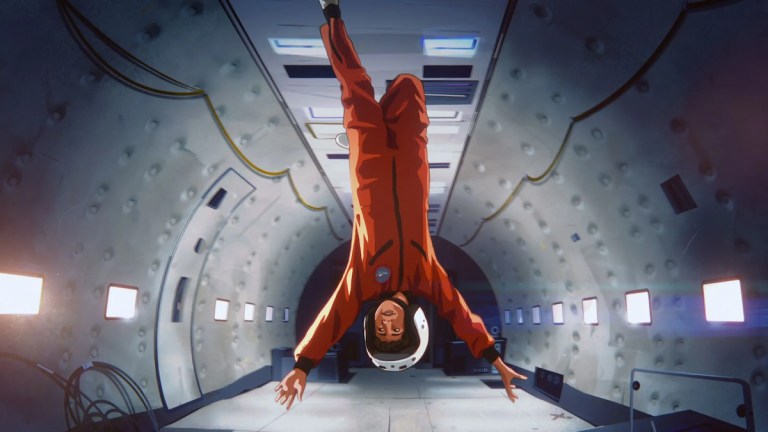Apollo 10 1/2 Review: Richard Linklater’s Love Letter to the Space Age
Richard Linklater triumphantly returns to rotoscope for Apollo 10 1/2, a childhood fantasy based on his own youth.

From Los Angeles to Austin, and Mexico to the UK, there appears to be something in the water sipped on by major directors. How else do you explain so many respected auteurs getting nostalgic for their formative years, be it Alfonso Cuarón’s Roma or Kenneth Branagh’s Belfast—Spielberg even has one out later this year. Yet Richard Linklater’s newest entry in the emerging genre, Apollo 10 1/2: A Space Age Childhood, might be the most happily youthful of these to date. For here is a reverie that’s less concerned about how things really occurred than it is with capturing the exuberance of how they’re remembered.
With a dream logic that doesn’t bother to distinguish the facts from fiction, the reality from the flights of fancy, Linklater revisits his halcyon days by recollecting the simple joys (and tedium) that come with being a boy during a specific moment in history.
For longtime fans of the Boyhood and Before Sunrise director, Apollo 10 1/2 is also something of a stylistic homecoming; the film marks the first time in over 15 years the writer-director has dabbled in rotoscope animation since he popularized the art-form among indie enthusiasts via Waking Life (2001) and A Scanner Darkly (2006). Returning triumphantly here to the aesthetic of animating artwork on top of actual live-action photography and actors, the filmmaker finds new texture to the style by using it to accentuate the slipperiness of a child’s memories—and as a storytelling device that is meant to be as accessible for audiences who enjoyed School of Rock as it is for those keyed into Slacker.
The child at the center of the movie’s fantasy is named Stanley (Milo Coy). Nine-years-old and going on 10, Stanley’s grown alongside the ‘60s decade he’ll come to retroactively cherish. By the summer of ’69, he’s obsessed with the local heroes of NASA, like everyone else in his Houston suburb; the lad can even recite by memory every astronaut who participated in the Mercury and Apollo space missions.
Growing up during the space race and in a part of the country where everything is newly built to accommodate it, Stanley’s memories are thus closely tied with the American zeitgeist of that moment, even as Stan admits now in voiceover (lovingly provided by Jack Black) that he didn’t quite feel part of it. The “youth gap” that his older sisters resent as their folks support the Vietnam War on television is completely foreign to Stan; he cares more about watching Dark Shadows after school and finding ways to avoid his principal’s corporal punishments for misbehavior in the classroom.
Nevertheless, unbeknownst to his family, Stan is also secretly involved with NASA. In between sequences that provide slices of the many joys and sorrows that come with being a kid, there’s also a subplot about Stan working on the side for NASA; he’s part of their clandestine Apollo 10 1/2 mission—the result of NASA accidentally building a space module too small and, instead of scrapping it, deciding to recruit a local fifth grader to pilot it to the moon one week before the Apollo 11 mission.
The way Linklater seamlessly slips between joyful vignettes of his pint-sized doppelgänger going to Astroworld (a now defunct local theme park) with the same kid also being an ace pilot who’s so cool under pressure that he’s reading MAD Magazine during launch, speaks to the wonderful simplicity of a child’s logic and understanding of the world. Yet the intelligence of the film’s adult perspective is derived from its wisdom to not talk down to those fantasies or sheepishly mock their naivety. Apollo 10 1/2 recounts them with the same earnest cadence that it records Stan’s steady diet of ‘60s television, seeing value in soberly and honestly savoring delusions alongside the memories of one-season TV wonders only someone who was then-nine would recall 50 years later.
The way Linklater seems to so easily access his subconscious, summoning with clear eyes the music and glories that linger in the back of any adult’s dream life, has been an impressive staple of many of his films, from the 12-year passion project of Boyhood to the high school delirium of Dazed and Confused.
In its own way, Apollo 10 1/2 might be viewed as a prequel to the latter. Yet it’s the film’s insistence on preserving the innocence of that era, even as it admits “Stanley” was a sheltered white kid obviously living in tumultuous times, that makes the movie stand apart and find new value in its rotoscope designs—even cheekily animating over the actual cartoons Linklater grew up watching.
In its own way, then, Apollo 10 1/2 is another fine entry into the apparently new genre of directors’ sojourns down memory lane. So far, this critic has liked all of the recent films touching on these ideas, with each demonstrating how remarkably distinct and individual formative experiences can be. As a consequence, the movies are as different as the men who’ve made them.
Linklater’s, however, is the most pure and unadulterated even as it is clearly the furthest from a reality that perhaps could only ever exist in a child’s eyes.
Apollo 10 1/2 premiered at the SXSW Film Festival on March 13. It debuts on Netflix on April 1.
